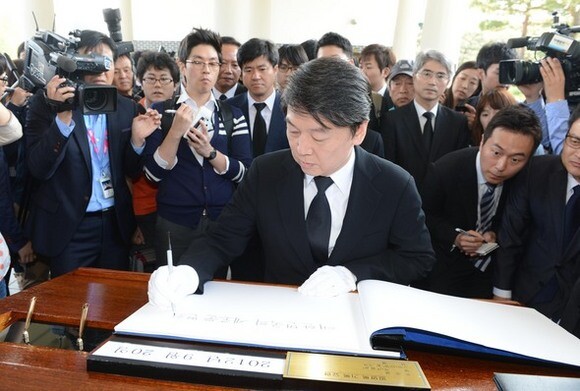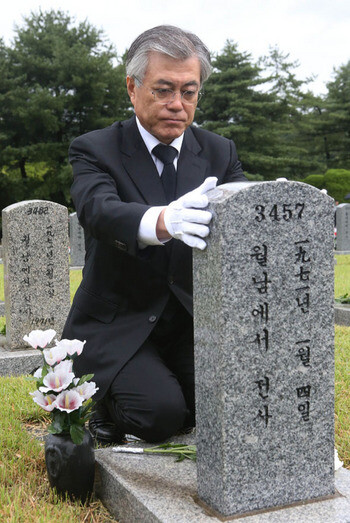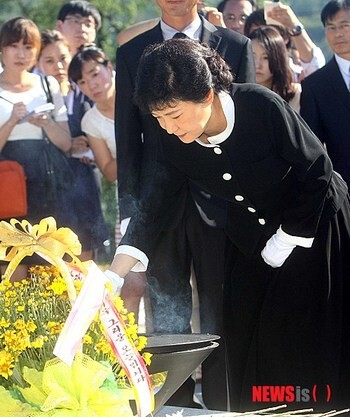hankyoreh
Links to other country sites 다른 나라 사이트 링크
Ahn visits National Cemetery in first political act

By Seong Han-yong, political correspondent
Ahn Cheol-soo made his first move as a politician on Sept. 20 with a visit to the National Cemetery. This comes just one day after the software mogul formally announced his bid for the presidency.
After paying his respects at the Memorial Tower, he left a message in the visitors’ book reading, “I will work my hardest for a new change of the Republic of Korea.”
He also paid respects at the graves of POSCO founder Park Tae-joon and former presidents Rhee Syngman, Park Chung-hee, and Kim Dae-jung. He left the same message in all four visitors’ books: “I intend to learn from history.”

Politicians send a message to the people with their actions. So what message was Ahn sending as a presidential candidate by visiting the National Cemetery? Speaking to reporters after paying respects at the tombs of soldiers there, he said, “I think people in high public office pay respects at the National Cemetery for two reasons. First, they are reaffirming their willingness to learn from history. If there are good and bad things, they want to work to carry on the good things and set the bad things right. Second, those who are buried here are the owners of our history - not just the generals, but also the many nameless soldiers. So I think this can serve as an opportunity to be reminded how the people are the true owners of the Republic of Korea.”
His explanation was couched in moral terms. But what are the political implications of his comments?
Conservatives in South Korea often praise Rhee Syngman and Park Chung-hee, while progressives laud Kim Dae-jung. The fact that Ahn visited the graves of all three could be read as a message that he does not intend to favor either side as a presidential candidate. He communicated similar thoughts in his declaration of candidacy the day before, saying it was “hypocritical to paint half the people as enemies and at the same time call for ‘unity’” and declaring that he planned to “transcend the politics of division and hatred.”
Most of the people supporting Ahn now lean toward the opposition or identify as moderates and independents. The first group is now faced with the question of whether to support him or Democratic United Party candidate Moon Jae-in. The latter two segments are a “blue ocean” for Ahn. His supporters are largely in the greater Seoul area and range in age from their twenties to forties. He would have to rally as many of them as possible to bring his support ratings up. There is also the possibility that he can draw in some supporters of New Frontier Party candidate Park Geun-hye who agree with his ideas about “new politics.” In that sense, his National Cemetery visit was “customized” to take into account both his own political leanings and the current political climate.
It also stood in strong contrast with the actions of other candidates. During a visit on Sept. 17, Moon paid respects at the graves of Kim Dae-jung and soldiers. At a time when he has yet to establish a real footing for himself as an opposition candidate, he sent the political message that he intends to shore up the support of progressive and reformist voters.
On August 21, Park Geun-hye visited the gravesites of all the former presidents at the National Cemetery, including Kim Dae-jung. She then traveled to Bongha Village in South Gyeongsang province to pay respects at the grave of another former president, Roh Moo-hyun. Having already secured the strong support of conservatives, she was seemingly attempting to come across as someone who also embraced people with “different ideas.”

The current election environment, roughly speaking, has Moon and Park coming out as representatives of the opposition and ruling party, while Ahn, whose support base overlaps with Moon’s to some extent, is trying to reach out to moderates and independents.
Ahn says he is shooting for a politics of unity and harmony, but will he be successful? Political commentator and president of Humanitas Publishing Park Sang-hun, who wrote the book “The Discovery of Politics,” said the essence of politics was “attempting to reach a consensus through battling in a society of numerous opposing interests.”
“I don’t think it’s really appropriate to take issue with the very idea of fighting when you’re a political player,” Park added.
Indeed, it is very likely there will be fewer and fewer moderates and independents as the candidates’ race heats up. Ahn faces a stern task.
Please direct questions or comments to [english@hani.co.kr]

Editorial・opinion
![[Column] Park Geun-hye déjà vu in Yoon Suk-yeol [Column] Park Geun-hye déjà vu in Yoon Suk-yeol](https://flexible.img.hani.co.kr/flexible/normal/500/300/imgdb/original/2024/0424/651713945113788.jpg) [Column] Park Geun-hye déjà vu in Yoon Suk-yeol
[Column] Park Geun-hye déjà vu in Yoon Suk-yeol![[Editorial] New weight of N. Korea’s nuclear threats makes dialogue all the more urgent [Editorial] New weight of N. Korea’s nuclear threats makes dialogue all the more urgent](https://flexible.img.hani.co.kr/flexible/normal/500/300/imgdb/original/2024/0424/7317139454662664.jpg) [Editorial] New weight of N. Korea’s nuclear threats makes dialogue all the more urgent
[Editorial] New weight of N. Korea’s nuclear threats makes dialogue all the more urgent- [Guest essay] The real reason Korea’s new right wants to dub Rhee a founding father
- [Column] ‘Choson’: Is it time we start referring to N. Korea in its own terms?
- [Editorial] Japan’s rewriting of history with Korea has gone too far
- [Column] The president’s questionable capacity for dialogue
- [Column] Are chaebol firms just pizza pies for families to divvy up as they please?
- [Column] Has Korea, too, crossed the Rubicon on China?
- [Correspondent’s column] In Japan’s alliance with US, echoes of its past alliances with UK
- [Editorial] Does Yoon think the Korean public is wrong?
Most viewed articles
- 1‘We must say no’: Seoul defense chief on Korean, USFK involvement in hypothetical Taiwan crisis
- 2N. Korean delegation’s trip to Iran shows how Pyongyang is leveraging ties with Moscow
- 3‘Weddingflation’ breaks the bank for Korean couples-to-be
- 4Korea sees more deaths than births for 52nd consecutive month in February
- 546% of cases of violence against women in Korea perpetrated by intimate partner, study finds
- 6Will NewJeans end up collateral damage in internal feud at K-pop juggernaut Hybe?
- 7[Column] Park Geun-hye déjà vu in Yoon Suk-yeol
- 8[Editorial] New weight of N. Korea’s nuclear threats makes dialogue all the more urgent
- 9Amnesty notes ‘erosion’ of freedom of expression in Korea in annual human rights report
- 10“Parental care contracts” increasingly common in South Korea